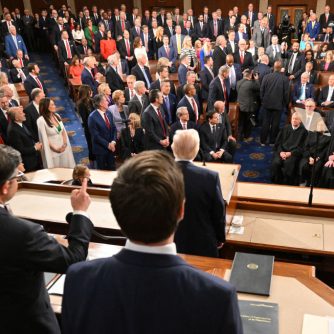On this episode of Carolina Newsmakers, Dale Folwell, the outgoing North Carolina State Treasurer, sits down with Don Curtis to reflect on his eight years in office, discuss his achievements, and share his concerns about the financial future of the state. Folwell, who chose not to seek reelection, also provides advice for his successor and sheds light on critical issues such as health care costs, the state pension plan, and disaster recovery.
Folwell begins by discussing the transition process with incoming Treasurer Brad Brodyer. He emphasizes the importance of fiduciary responsibility, reminding his successor that the treasurer’s role is to serve those who teach, protect, and serve North Carolina. Folwell stresses the need to manage the state’s $250 billion in assets prudently and conservatively, highlighting the challenges of maintaining financial discipline amid increasing demands on public funds.
A major focus of the conversation is the state health plan, which Folwell describes as facing significant insolvency challenges. He points out that despite efforts to reduce costs, including transitioning the health plan’s administrator from Blue Cross Blue Shield to Aetna, the plan is grappling with deficits exacerbated by COVID-related expenses and skyrocketing prescription drug costs. Folwell underscores the urgency of addressing these issues, noting that unchecked costs could lead to significant premium increases for state employees.
Folwell criticizes the influence of what he calls the “health care cartel,” pointing out the disparity between the billions of dollars in tax benefits received by hospitals and the lack of transparency in health care pricing. He advocates for reform, calling on legislators and health care providers to align their practices with the interests of North Carolinians. He also mentions his controversial stance on weight-loss drug coverage, explaining that such expenses threaten the financial stability of the health plan.
Shifting to the state pension plan, Folwell highlights its robust health, noting that it remains one of the best-funded plans in the country. He attributes this success to the sole fiduciary model, which he believes ensures clear accountability and decision-making. While the plan is financially stable for now, Folwell warns that demographic shifts, such as fewer workers contributing to the system compared to retirees drawing benefits, could create long-term challenges.
The discussion also touches on North Carolina’s Triple-A bond rating, a status achieved by only 13 states. Folwell celebrates the state’s fiscal discipline, which has allowed it to retire significant portions of its debt and maintain a strong financial position. He stresses the importance of continued conservative financial management to preserve this coveted rating, especially as the state grapples with costly disaster recovery efforts in western North Carolina.
Disaster recovery is another key topic, with Folwell detailing the financial and logistical challenges of addressing infrastructure damage caused by hurricanes and flooding. He calls for meticulous tracking of expenditures to maximize federal reimbursements and urges a focus on rebuilding critical infrastructure efficiently.
In addition to his reflections on policy, Folwell shares personal anecdotes, including his encounters with skepticism about the state’s unclaimed cash program. He encourages listeners to check the NC Cash database, noting that the state has returned over $650 million in unclaimed funds during his tenure. Folwell’s stories underscore his commitment to serving the people of North Carolina and ensuring transparency and accountability in government.
As he looks to the future, Folwell expresses a desire to continue advocating for reform in health care and other critical areas. He emphasizes the importance of addressing systemic issues such as the national debt, which he views as a significant threat to economic stability. Folwell also hints at a personal commitment to maintaining a balanced life post-office, focusing on faith, family, and his passion for fixing problems.
Folwell concludes by advising his successor to prioritize transparency, avoid political distractions, and remain focused on the mathematical realities of managing public funds. He reflects on the lessons learned during his career and the importance of advocating for those without political influence, whom he refers to as “the invisible.”





